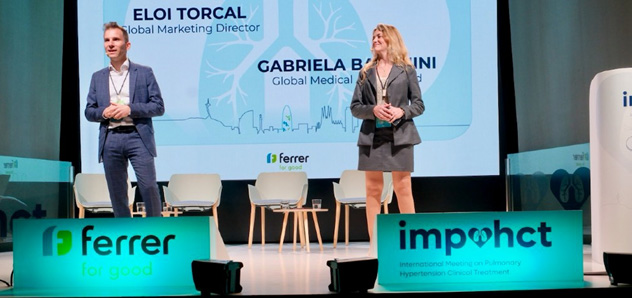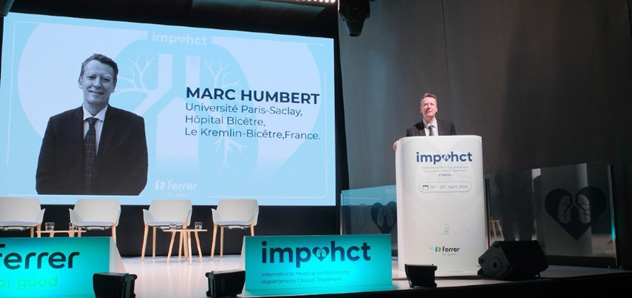Report from IMPAHCT 2024

Approximately 150 pulmonary hypertension (PH) specialists convened in Barcelona in April 2024 for Ferrer’s 6th edition of the IMPAHCT meeting. Notably, Hall Skaara represented PHA Europe for the second time at the conference, serving as the sole patient advocate present.
The conference commenced with a series of sessions dedicated to the diagnosis, classification, and comorbidities associated with pulmonary hypertension. Esteemed PH experts from Spain, Italy, and France led discussions on various PH patient groups, highlighting both differences and similarities in classification. Concerns were raised about the adequacy of the current classification system, particularly for patients with comorbidities spanning multiple PH classes. Additionally, biomarkers of PH, such as NT-ProBMP, were discussed for their potential to provide survival estimates, despite the absence of a definitive diagnostic marker for PH.
The latter part of the day was dedicated to the patient perspective. Physicians from Austria, France, and England shed light on the challenges faced by individuals living with PH. They initiated the discussion with insights from a patient-focused study initiated by Ferrer, where PH-ILD patients (PH Group 3) shared their experiences. Quality of Life (QoL) issues were addressed, including the impact of PH on employment, social interactions, and emotional well-being. During the subsequent round table discussion, Hall emphasized the often-overlooked aspect of QoL in PH patient care, advocating for greater patient involvement in decision-making processes. He underscored the importance of pharmaceutical companies integrating patients into trial designs and conferences, alongside healthcare professionals (HCPs) actively engaging with patient voices during disease management.
Considerable attention was also devoted to Patient Reported Outcome Measures (PROMs) during the round table discussions. Iain Armstrong highlighted the role of PROMs in facilitating dialogue between patients and physicians, particularly through tools like emPHasis-10. Many other benefits of PROMs were discussed, including their potential to guide individualized treatment options, detect medication side effects, and supplement traditional clinical measurements.
The following day commenced with “coffee with the expert” sessions, where leading PH specialists provided insights and engaged in discussions with subgroups of the audience. Subsequently, challenges in PAH management were addressed in a session hosted by Professor Stephan Rosenkranz. Professor Olivier Sitbon presented groundbreaking information on intermediate to high- risk patient management, likely to influence forthcoming PH guidelines. Professor Michele D’Alto emphasized the importance of including right heart ventricle status in the treatment management of PH patients, highlighting the potential differences in patient cases despite similar biomarker values and hemodynamics.
The subsequent section focused on PH management and status in different parts of the world, featuring representatives from Colombia, Mexico, Taiwan, and Spain. While all follow PH guidelines in their treatment approaches, the session explored variations influenced by factors such as medication access, altitude, patient association relationships, and population demographics.
The conference concluded with a thought-provoking session addressing the challenges of managing pulmonary hypertension associated with interstitial lung disease (PH-ILD). This subgroup presents unique difficulties as patients contend with both underlying lung disease and pulmonary hypertension simultaneously. Unfortunately, treatment options for this cohort remain limited, significantly impacting patient survival rates.
Following this discussion, the conference wrapped up with an award poster ceremony led by Professor Marc Humbert. Nineteen posters were submitted by attendees, with three winners selected to represent research interests from England and South America. Notably, the conference marked a noteworthy milestone as a poster authored by a patient was accepted for the first time. Hall presented a poster based on a paper, of which he was a co-author, shedding light on the patient experience of living with PH.
Two news media channels covered the event. Hall was selected to offer the patient perspective, which he conveyed through a video interview and a subsequent discussion with a Spanish newspaper.






